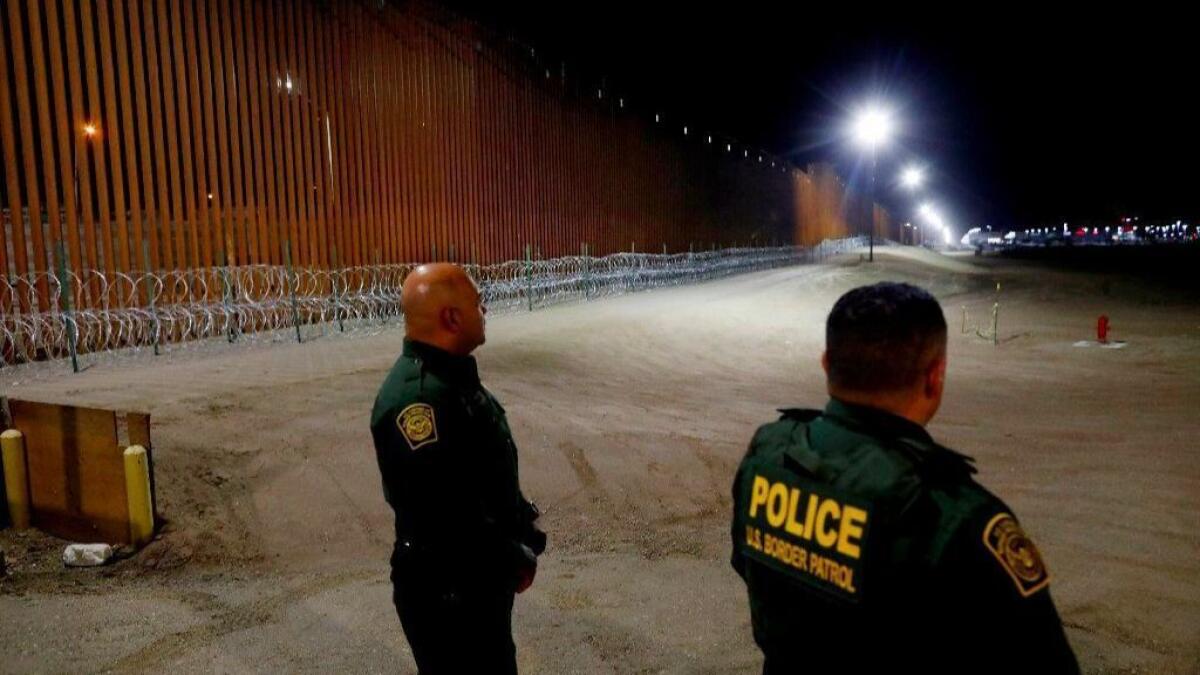Trump says he will veto bill aimed at rescinding his emergency declaration for a wall

Reporting from Washington — The House will vote Tuesday on a resolution to overturn President Trump’s national emergency declaration aimed at providing money to build a wall along the southern border, Speaker Nancy Pelosi (D-San Francisco) said Friday.
Trump responded with a vow to veto the resolution, if it reaches his desk.
Trump issued the emergency declaration a week ago, after Congress passed legislation that included $1.375 billion for border barriers, but no money for a wall and far less than the $5.7 billion he had requested.
Trump says the wall is necessary to address illegal immigration. Critics note that unauthorized border crossings have fallen in recent years and accuse Trump of manufacturing a crisis after Congress refused to give him taxpayer funds to fulfill a major campaign promise. Originally, he promised Mexico would pay for the wall.
The resolution, filed Friday, is sponsored by the chairman of the Congressional Hispanic Caucus, Rep. Joaquin Castro (D-Texas), and has at least 226 co-sponsors, including Republican Rep. Justin Amash of Michigan.
It is almost certain to pass the Democratic-controlled House, but prospects in the GOP-led Senate are unclear.
The National Emergencies Act requires both chambers to consider the resolution in a timely manner. Assuming it passes the House, the Senate would have 18 days to vote.
That will require Senate Republicans to take a position on Trump’s unprecedented use of executive authority to declare a national emergency to pay for a domestic project that Congress has explicitly declined to fund.
It would take just four Republicans voting with all Democrats to pass the resolution. At least that many GOP lawmakers have expressed concerns with the emergency declaration route the president has chosen, but so far only Republican Sen. Susan Collins of Maine has said she’ll back the resolution.
Democrats, and some Republicans, have argued that Trump’s order violates the separation of powers outlined in the Constitution, which grants Congress the power to decide how the government spends taxpayer dollars.
“The president’s act is lawless and does violence to our Constitution, and therefore, to our democracy,” Pelosi said Friday on a call with reporters. “Not only is he disrespecting the legislative branch and the Constitution of the United States, he is dishonoring the office in which he serves.”
Castro said he’s encouraging Republicans to join the effort, warning that “if the Congress rolls over on this, then the president is likely to do it again.”
If Trump issues what would be the first veto of his presidency, it could be difficult for Congress to override him with the required two-thirds of the vote.
Democrats will likely also throw their weight behind lawsuits trying to halt the wall construction, and could try to legislatively block Trump from accessing funds for certain projects. Pelosi wouldn’t commit to other efforts Friday.
The administration began making its case for the funding on Capitol Hill on Friday, with the Defense Department staff meeting with House and Senate Appropriations Committee staff to discuss next moves.
Defense officials sought to reassure lawmakers that they will try to minimize the effects on pet projects in lawmakers’ home districts, and that shifting funds would not hurt troop readiness, according to a Pentagon official who briefed reporters Friday on the condition that he not be identified.
“We’re looking for minimal impact,” the official said, adding that money to build or renovate military housing would not be touched.
Mick Mulvaney, Trump’s acting chief of staff, told reporters last week that the declaration would free an additional $6.6 billion for barrier construction. That amount includes more than $2 billion in unspent Pentagon counter-drug program funds and $600 million from a Treasury Department asset forfeiture account.
The administration may also move $3.6 billion from military construction projects that Congress has approved funds for, but has not yet spent. No details have been provided about where exactly the administration plans to pull funds from, and members on both sides of the aisle are leery about how it might affect projects in their districts.
According to Democrats on the House Appropriations Committee, among the hundreds of eligible projects Trump could pull funds from are electrical upgrades at Camp Pendleton, replacing Pier 8 in San Diego and multiple training facilities at Coronado.
Even with the emergency declaration, Acting Defense Secretary Patrick Shanahan must still comply with a separate legal requirement to show that shifting funds from military projects would improve the “effectiveness” of troops along the border, according to the Pentagon official. The law leaves that determination entirely up to Shanahan.
“He will make a very deliberate decision, per the law, but the law doesn’t establish criteria,” said the official.
The Pentagon has asked for, but not yet received, a list of projects along the border that the Department of Homeland Security wants to fund from the Pentagon budget, the official said. Once it has the list, officials will determine if the projects actually would help to curtail drug smuggling and illegal border crossing, a process that could take weeks. Months will likely pass before any construction begins, the official said.
More stories from Sarah D. Wire »
More to Read
Get the L.A. Times Politics newsletter
Deeply reported insights into legislation, politics and policy from Sacramento, Washington and beyond. In your inbox three times per week.
You may occasionally receive promotional content from the Los Angeles Times.












